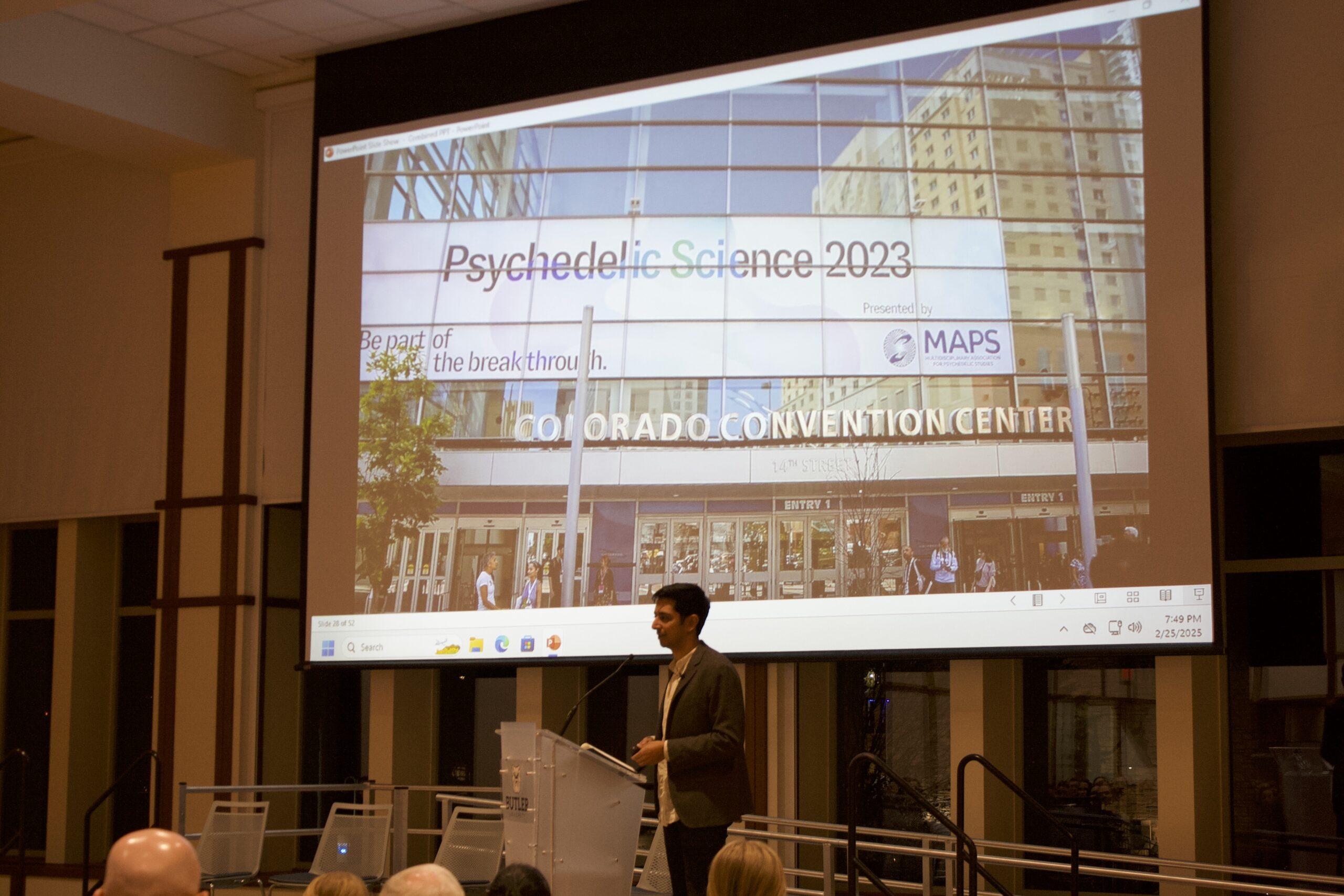Psychedelic researcher Fayzan Rab discusses his research path. Photo by Katerina Anderson.
ERIKA KOVACH | STAFF REPORTER | ekovach@butler.edu
The Compass Center presented the latest discussion in its ongoing speaker series, themed “Religion and the Mind” on Tuesday, Feb. 25. The open panel welcomed professional speakers to campus and allowed Butler professors to weigh in on the dynamic conversation of mind-altering substances in religion.
James McGrath, the department chair of philosophy and religious studies, explained that the university holds a Religion and Society series that brings four speakers to campus every year. This year, the theme was inspired by his long-standing interest in the relationship between religion and science, specifically Artificial Intelligence (AI).
These ideas brought figures including Andrew Newberg and Anne Foerst, two researchers of topics including spirituality and AI, to campus earlier this year. However, the idea of religion and psychedelics had also been of interest to McGrath, leading him to one of his peers and speakers at the event, Jaime Clark-Soles, a reverend with experience in the controlled use of psychedelics in therapeutic settings.
Clark-Soles was also joined by Fayzan Rab, a psychedelic researcher passionate about combining Eastern and Western traditions in science and medicine.
The nature of the topic at hand also allowed for other Butler faculty in pharmacy and health sciences, psychology, neuroscience and religious studies to contribute and engage in the discussion as well.
The panel began with speaker Clark-Soles, who discussed the language and definition of the word “psychedelic.” As a previous participant in a psilocybin, or hallucinogenic mushroom, study, she said that psychedelics personally provided her with one of the top five spiritual experiences of her lifetime.
“When contemporary Christians have mystical experiences, they stand in a long line of prophetic figures who have done the same,” Clark-Soles said.
She also explained that psychedelics can provide a variety of benefits both in and beyond the religious space, including spiritual formation and medical treatment.
This point was reemphasized by speaker Rab, who discussed his studies of cancer patients and the use of psychedelics. In these patients, alternative medicine can often help to eliminate end-of-life distress.
Rab also spotlighted his focus group of Muslims in the United States, an area of interest as he explained that many people assume they might not engage with mind-altering substances due to religious beliefs and customs that disallow them from other substances like alcohol.
However, Rab explained that the attitudes of many U.S. Muslims are similar to that of dominant Christian groups who are open to discussions of legalization, with therapeutic and spiritual benefits. From many studies, Rab found that Muslim groups are more inclined to view mental health and general well-being as synonymous with spiritual health, something that might be assisted by psychedelics.
The panel ended by inviting Chad Bauman, professor of religion, and Amy Peake, associate director and department chair of health sciences, to the stage to ask about their own studies and engage with the audience questions as well.
Junior religious studies major Dane Bultemeier said he attended the conversation due to his major and general interest in all things regarding religion and spirituality.
“This specifically interests me because being in college, I’ve had a lot of exposure to people who have tried various substances,” Bultemeier said. “One of my classes is even offering as an extra credit [to attend].”
The unique discussion at this event leaves McGrath hopeful that students who might not usually attend public lectures enjoy the ideas and attend the series in the future.
“I hope that they will discover that both inside and outside the classroom, Butler offers opportunities to explore so many big, deep, and important topics from a wide range of angles,” McGrath said.



